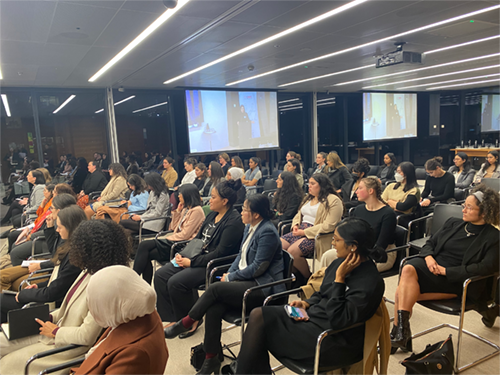- Autumn 2023
- Me and My Shadow

In 2022, Diverse Women in Law (DWL) debuted their Barrister Shadow Program. The program was designed to give junior solicitors and PLT students who identify as diverse women the opportunity to experience a day in the life of a barrister.
Over 40 barristers volunteered their time to assist the program, including senior and junior counsel from various backgrounds and practice areas. Barristers involved were members of the private bar, and also members of the Crown Prosecutors Chambers and the Public Defenders Office. There is no requirement that volunteering barristers are diverse women, and DWL encourages the participation of all members of the Bar as mentors and allies. The program operates on a model that facilitates a one-day placement with a barrister, in order to provide the junior solicitor or student an opportunity to gain practical experience and to explore a potential career at the NSW Bar.
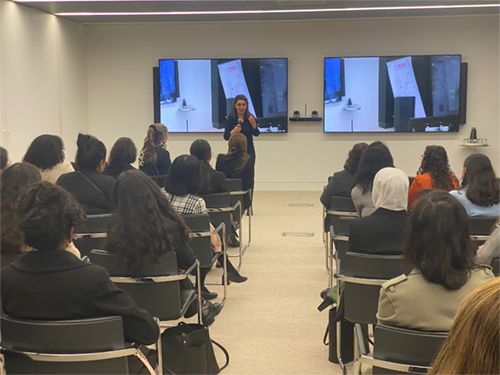
The program commenced with an induction from Justice Dina Yehia of the Supreme Court of NSW, Rose Khalilizadeh of the NSW Bar and Shahad Al Majed (Associate to Justice Dina Yehia), where participants were given advice about how to approach their time in the program. Each DWL participant was then paired with a barrister aligned with her interests and shadowed that barrister for a day. In some cases, this involved attending court with the barrister, or sitting in on conferences or mediations, or accompanying the barrister to work in chambers.
The feedback from the inaugural 2022 Barrister Shadow Program suggests that the DWL participants found it very useful to be able to look ‘behind the scenes’ and see what the work of a barrister involves day to day. For some participants, it was their first time inside a courtroom. For others, they appreciated the more in-depth look at the degree of preparation required for a day in court, how to manage clients, and how to balance the work of a barrister with life outside the courtroom. In some cases, the barrister and participant have gone on to form an ongoing mentoring relationship.
DWL is hoping to roll the Barrister Shadow Program out more extensively across New South Wales and welcomes expressions of interest from any members of the NSW Bar who are willing to volunteer for the program. BN
The Barrister Shadow Program program was run by the DWL Criminal Law Portfolio, with the immense assistance of student volunteers, and portfolio/senior managers Elleni Zacharia, Carol Younes and Tara Reddy, with oversight from Rose Khalilizadeh. DWL is grateful for the support of the NSW Bar Association, and its members, for welcoming and encouraging diverse women to join the ranks of the NSW Bar. www.diversewomeninlaw.com.au
DWL was founded in 2019, and it aims to support ‘Diverse Women’ through networking, targeted mentoring and professional development opportunities with industry stakeholders. DWL define ‘Diverse Women’ as those law students and lawyers who self-identify as women, non-binary and gender diverse; and who also self-identify as being one or more of the following under-represented backgrounds:
• culturally and linguistically diverse persons;
• Aboriginal or Torres Strait Islander persons;
• LGBTQI+ persons;
• people living with disability;
• people who are or have experienced
socio-economic disadvantage; and
• people with caring responsibilities.
SPOTLIGHT ON:
Gaganjot Gill (GG) (third-year law student at the University of Sydney) and barrister Zaid Khan (ZK) (Black Chambers) who speak about their experience participating in the Barrister Shadow Program.

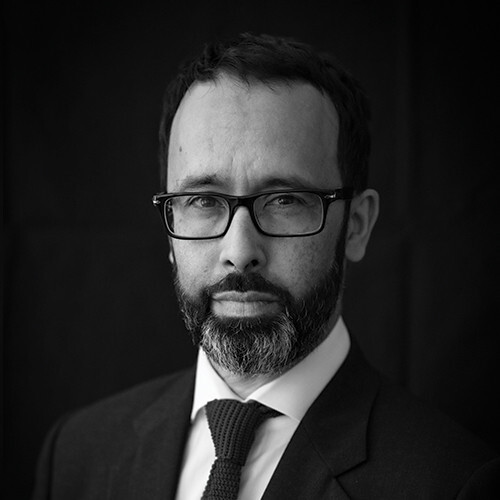
Why did you take part in the DWL Barrister Shadow Program?
GG: I signed up for the DWL Barrister Shadow Program as I am still in the early years of my legal education and wanted to experience firsthand what it would be like to pursue a career at the bar. I was also interested in understanding and seeing the personality and drive of barristers, in general.
ZK: I think it’s important to try and ‘give back’ to the profession in any way that one can. Mentoring and shadowing programs provide a firsthand experience of the court process and an invaluable insight into the workings of the criminal justice system.
What did you do on the shadowing day?
GG: On our shadowing day, I met Mr Khan at his chambers, and accompanied him to a Sydney District Court sentencing. I was also able to witness Mr Khan’s preparation before the sentencing which gave me an insight into his work and methodology. At court I was introduced to other barristers, and had the matters before the court, explained to me. I was lucky to enough to have Mr Khan invite me to other proceedings he was involved in throughout the end of last year, and he invited me to stay connected.
What do you see as the benefit of the DWL Barrister Shadow Program for the diverse women participants?
GG: Being a diverse woman myself, I came from a background where I did not know any lawyers or barristers. I didn’t really understand exactly what a career in law would look like outside of my degree. The program is incredibly beneficial for young diverse women participants who have limited experience with the legal world or, like me, didn’t know what a career at the bar would look like and didn’t know where to look for a better understanding.
ZK: I’m hoping that the DWL participants in the program have observed the changing face of the profession – that they saw other women barristers and solicitors that look like they do, and it gave them the confidence and belief that, despite the traditional stereotypes, this is a profession that is well on the way to reflecting the diverse backgrounds that make up our communities. And a profession in which they can have a feeling of belonging.
Gaganjot, did shadowing a barrister have any impact on your ideas about the work a barrister does?
GG: Being able to witness firsthand what is required of a barrister both during and before their matter; the extensive understanding and preparation required, helped me understand the path better than before. Having talked to Mr Khan throughout the shadowing day, about his experiences and importantly, why he chose to become a barrister better exposed to me the realities of pursuing a career at the bar, and the reality of dealing with sometimes confronting and emotional matters. Having shadowed Mr Khan, I’m now better educated on the path, and can see that it is quite a rigorous but still rewarding career path.
What would you say to NSW barristers about why they should choose to be involved in the program as mentors?
GG: I think joining the program as a mentor is a great positive act to do, you are giving back to our young community, and essentially helping young law students like me better understand your career and world. I found the program really beneficial and eye-opening, and it was due to Mr Khan’s mentorship and demonstration.
ZK: The benefits for the DWL participants are obvious, but for me personally, I found it extremely encouraging to see that there are young women from marginal communities, usually from the western and southwestern suburbs of Sydney, who are studying law and changing the face of what has traditionally been a white /Anglo-Saxon / male profession.
SPOTLIGHT ON:
Jennifer Taylor (JT) (second-year law student at the University of Newcastle) and barrister Elizabeth McLaughlin (EM) (Public Defenders Chambers) who speak about their experience participating in the Barrister Shadow Program.

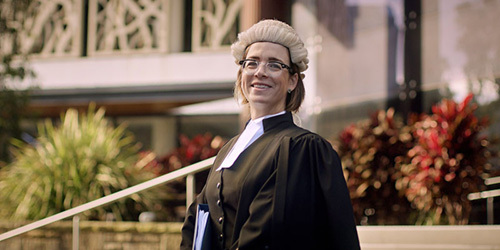
Why did you take part in the Barrister Shadow Program?
JT: I discovered the DWL program during winter break during my first year of law school. I was trying to find something to do during my time off from study during the school break. Prior to being a full-time student, I had always worked full-time, so I was eager to find something to keep me busy. That was when I found the Barrister Shadow Program. The program is very attractive to any student who actively seeks to advance their knowledge in the legal field, as it provides networking and practical experience to disadvantaged women who would not otherwise have those opportunities.
EM: I was actually asked to volunteer. DWL had received the enquiry from Jennifer, who was based in Newcastle. I had often seen the advertisements for DWL programs, but I had assumed they were Sydney-based. When the request came through, I was very happy to help.
What did you do on the shadowing day?
JT: My day started in Lizzie’s chambers where we had a quick introductory chat before going to the Newcastle Court House. Lizzie introduced me to the Legal Aid solicitor representing our first client and allowed me to quickly read through the brief. I was able to observe Lizzie interview the client and prepare him for his sentence hearing. When court was finished, we headed back to Lizzie’s chambers. I spent the rest of the afternoon reading case files and chatting with Lizzie about my ideas and views on the cases. I felt like Lizzie was genuinely interested in my opinions and enjoyed throwing ideas back and forth. Lizzie and I also discussed a moot assignment that I was doing the next day, and she was extremely helpful with giving me tips on my advocacy, like being clear and to the point.
EM: I thought it would be best if Jennifer could observe a short matter in court from start to finish, so we chose a sentence proceeding. Jennifer came into chambers before court, and I provided her with a summary brief to read so that she understood the matter. She was then able to shadow me during the conferences, observe the submissions in court, and she was also able to see the sentence handed down at the end of the same day.
What do you see as the benefit of the DWL Barrister Shadow Program for the diverse women participants?
JT: The one day I spent with my barrister completely changed my confidence as a law student. During my childhood and teen years, I moved homes frequently and I was always changing schools. This instability meant that I did not finish high school. I enrolled in Open Foundations to receive my HSC equivalent, and I started my law school journey at the age that most students would have graduated. I found that many of my classmates came from families with academic backgrounds, whereas I had no one in my family who had finished high school, let alone university. I often felt left behind because of my early life disadvantage, and I felt out of place in my law degree. The Barrister Shadow Program has completely changed my self-esteem and confidence. Lizzie was so welcoming, and everyone working at the Newcastle courthouse. On my shadowing day, I felt like I had walked into my home. Now, when I have doubts about myself as a law student, I stop and reflect on how I felt during my shadowing day. The program re-affirmed that I am where I need to be, doing what I was meant to do.
EM: I hope it made the decision to practise law, and potentially be a barrister, something to aspire to and something that felt achievable. Jennifer’s level of motivation and focus was impressive, and I felt that our shadowing day was a small but valuable period for her.
What do you see as the importance of the DWL Barrister Shadow Program in regional areas in particular?
JT: I am based in the regional Maitland area. Compared to students who are in the city, it is hard to find opportunities to access practical experience and exposure to legal professionals. The Barrister Shadow Program expands opportunities for students in regional areas, that we would not otherwise have without programs like this. In turn, that will build stronger and more diverse legal professionals who are familiar with challenges faced by regional communities.
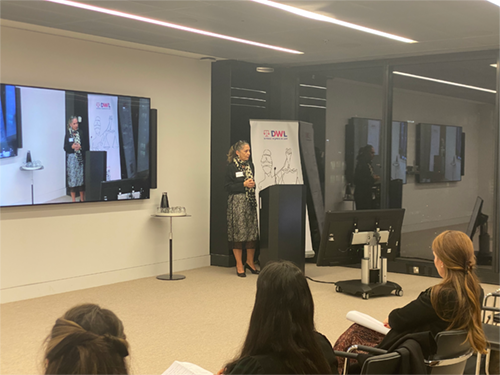
EM: There is far less visibility of barristers generally in regional areas, and even less visibility of women barristers. As a result, the young women who grow up regionally, and study regionally, have less exposure to that world and to those options. Programs like the DWL Barrister Shadowing Program are even more critical in regional areas because the further away from Sydney you get, the rarer you are as a female barrister. The experience of seeing barristers and advocacy happening day to day is just not as accessible. A student like Jennifer, who attended a local school and university, would not have access to an experience like this without a program like this one. Jennifer, did shadowing a barrister have any impact on your ideas about the work a barrister does?
JT: Before participating in the program, I enjoyed hiding in the back of my local court (Maitland Local Court), but I had never had the courage to talk to anyone or explore any further than just watching the advocates submit, and the Magistrate give decisions. The Barrister Shadow Program gave me an opportunity to see what goes on ‘behind the scenes’ and to appreciate the hours of hard work that goes into preparing for a hearing.
What would you say to barristers about why they should choose to beinvolved in this program as mentors?
JT: Please do volunteer. The Barrister Shadow Program is a fantastic way to share your knowledge with the next generation of lawyers. By investing just one day of your time, you could make a massive impact on someone’s development – it is just a day for you but for me as a student, it was the highlight of my year.
EM: I felt like I was contributing. I do frequently have longerterm students, so it wasn’t unique in that sense, but the advantage of the Barrister Shadow Program is that I really felt that I had made a contribution, but without any real inconvenience to myself or my practice because it was so contained. It was low maintenance from my point of view, as the barrister.
